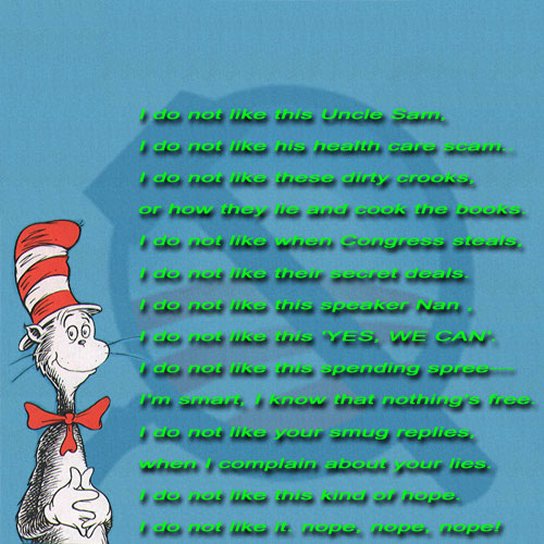
.
Show Me ObamaCare
Despite a voter rebuke, how an obscure mandate will reshape health care.
The Wall Street Journal
The political revolt against ObamaCare came to Missouri Tuesday, with voters casting ballots three to one against the plan in its first direct referendum. This is another resounding health-care rebuke to the White House and Democrats, not that overwhelming public opposition to this expansion of government power ever deterred them before.
Missouri’s Proposition C annulled the “individual mandate” within state lines, or the requirement that everyone buy insurance or else pay a tax. Liberals are trying to wave off this embarrassment, but that is hard to do when the split was 71.1% in favor in a state John McCain won by a mere 0.1% margin. The anti-ObamaCare measure carried every county save St. Louis and Kansas City with 668,000 votes, yet just 578,000 Republicans cast a ballot in the concurrent primaries.
If the practical effects of this conflict between state and federal law are likely to be limited, more importantly, Missouri’s vote revealed once again that the country is still aghast over President Obama’s health-care presumption. Earlier this week, the Congressional Research Service reported that the new bureaucracy the bill created is so complex and indiscriminate that its size is “currently unknowable.” Capitol Hill’s independent policy arm added that among “the dozens of new governmental organizations or advisory bodies,” it is “impossible to know how much influence they will ultimately have.”
No wonder Missourians rebelled, as with voters in Massachusetts, New Jersey and Virginia last year. There will be more such what-have-they-done ObamaCare moments. Wait until the public discovers the government is now literally determining what qualifies as “health care” in America.
That isn’t a typo. ObamaCare mandates that insurers spend a certain percentage of premium dollars on benefits, but Democrats never got around to writing the fine print of what counts as a benefit. So a handful of regulators are now choosing among the tens of thousands of services that doctors, hospitals and insurers offer. Few other government decisions will do more to shape tomorrow’s health market, or what’s left of it.
This command-and-control mechanism is the bill’s mandate for insurance “medical loss ratios” (MLR) of 85% for large employers and 80% for small businesses and individuals. The MLR is an accounting statistic that measures the share of premiums paid out in patient claims (“losses”). In the individual market, MLRs typically run between 65% and 75%, and Democrats like Jay Rockefeller and Al Franken think this is evidence of excessive profits, executive pay, marketing and other supposedly wasteful overhead.
The same mentality prevails in the Administration, so it may well adopt a narrow definition of medical expenses when it issues final regulations by early fall. The insurance industry is lobbying for a less rigid standard: It will be easier to run a business and turn a profit if more of the costs are considered truly medical in nature.
More notable is that people partial to ObamaCare but largely outside of politics are coming to understand the mess Congress has created. To wit, much of health care’s intellectual energy is moving toward a concept called the “accountable care organization,” which would replace today’s fragmented delivery system of mostly solo practitioners with teams of doctors and hospitals working together. These integrated groups would manage and coordinate care, use more information technology and try to improve treatment quality for chronic disease and complex conditions.
Yet “it isn’t easy to draw a bright line, or even a fuzzy line, between traditional health services and some of the more innovative coordinated models,” says Mark McClellan of the Brookings Institution and a leading accountable care proponent. The new model would rely on many tools that aren’t strictly medical, like, say, a checkup or a CT scan.
For example, how to classify a program to double-check doctors orders to avoid one of the unnecessary surgeries that kill some 12,000 people every year? Or counseling, calls, emails and other types of case management to make sure patients comply with their diabetes regimen? Or investments in electronic medical records? Obviously these programs aren’t the same as an O.R. visit, but they still cost money, often a lot of it, and many insurance programs pay or are starting to pay for them.
The possibility that these will be written out of the MLR definition is feeding a growing unease about politics shaping medicine more than it already does. The California Association of Physician Groups, the largest U.S. accountable care trade group, recently protested that a narrow MLR ruling “would create a disincentive for plans to contract with our members and undercut the coordinated care model.”
Health Integrated, a respected medical consulting firm, urged regulators “to avoid discouraging or inadvertently extinguishing the successful innovation that (so frequently) arises only from a plan’s ability to try new ideas.” Even North Dakota’s Democratic Rep. Earl Pomeroy, who voted for the bill, argues that tight MLR regulation “could have a chilling effect on future innovative programs.”
“The real question is the overall philosophical thrust, which will determine the long-term direction of health care,” Mr. McClellan says of the coming definition. The regulatory debate is dominated by Senator Rockefeller and others on the left who are still angry they never got a public option and are trying to use MLR as a proxy for controlling the insurance industry. The irony is that the new health models they claim to favor may be collateral damage, even as insurers take the fall for the problems Congress created.
Another danger concerns the individual market, where a wave of destruction could be imminent. If the MLR definition is so arbitrary that health plans can’t cover their claims and expenses, they’ll simply withdraw that book of business. Mila Kofman, Maine’s insurance superintendent and an ObamaCare supporter, warned that “the federal standard may disrupt our individual health insurance market” and is seeking an exemption. Her protest is all the more notable given that Maine’s health regulations closely resemble those that are about to be imposed nationwide.
Ms. Kofman and others are right to worry. In the 1990s, an MLR crackdown in Washington state caused the individual market to collapse in 36 of 39 counties. Too bad for the people with coverage today who were promised they could keep it if they liked it.
This fight over medical loss ratios is an early taste of how a “government takeover” operates in practice. The state insurance commissioners advising the federal government—and who know something about the business—have already missed several deadlines because writing a uniform definition of medicine is “time consuming,” while a wrong move would “destabilize the marketplace and significantly limit consumer choices.”
We predicted that under ObamaCare politicians and technocrats would dominate medicine, and here they come. Without more Missouri-style revolts—or perhaps in spite of them—the rest of us will soon learn how competent they really are.
.

Wild Thing’s comment…….
Greta said last night that Gibbs, when asked if this meant something, said, “No”.
The arrogance of Washington is breathtaking.
Will there have to be tarring and feathering before they realize the government is subject to the will of the people?
This is the ultimate misunderstanding of the constitution. The primary purpose of the Constitution is to limit government. When the elites do not realize they are LIMITED by this work, they are defying the main premise of this country.
And the twists and turns of the obamacare bill that keep coming out make it worse and worse if that is even possible, but it is.
 ……Thank you RAC for sending this to me.
……Thank you RAC for sending this to me.
RAC has a website that is awesome. 336th Assault Helicopter Company
13th Combat Aviation Battalion – 1st Aviation Brigade – Soc Trang, Republic of Vietnam

I’m happy with the numbers on the referendum. In our District 8 race, we were unable to unseat the RINO pork-barreler JoAnn Emerson. I was sad about that. I guess the D-8 republican party is still addicted to the free corn. Maybe we’ll have an independent tea partier to vote for in the general election.
Jim, thanks for the informationo about your District. It is very special to me that I am able to have a blog and get to know people like you Jim and the others here that love our country and really pay attention to what is happening. It is a blessing and an honor. And I learn so much from you and everyone that comes here in their sharing and input.
These people think they answer to nobody. Come on, November!
If the Tea Party runs people in races with Rinos it will upset the party Bramans and reduce the majority this election, at least some Democrarts will get elected. but in 2012 we may get fewer Rinos and more patriots.